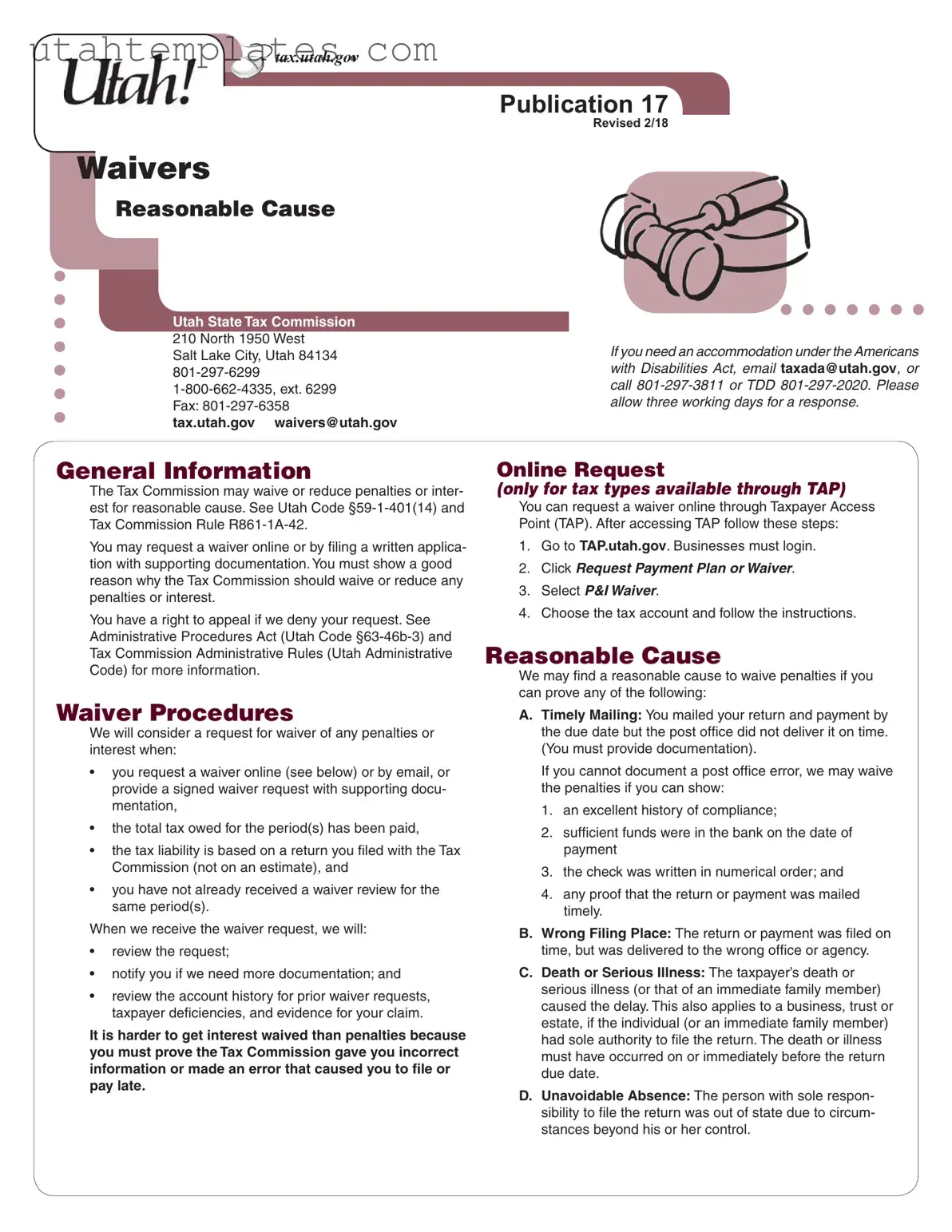tax.utah.gov
Waivers
Reasonable Cause
Utah State Tax Commission
210 North 1950 West
Salt Lake City, Utah 84134 801-297-6299
1-800-662-4335, ext. 6299 Fax: 801-297-6358 tax.utah.gov waivers@utah.gov
General Information
The Tax Commission may waive or reduce penalties or inter- est for reasonable cause. See Utah Code §59-1-401(14) and Tax Commission Rule R861-1A-42.
You may request a waiver online or by filing a written applica- tion with supporting documentation. You must show a good reason why the Tax Commission should waive or reduce any penalties or interest.
You have a right to appeal if we deny your request. See Administrative Procedures Act (Utah Code §63-46b-3) and Tax Commission Administrative Rules (Utah Administrative Code) for more information.
Waiver Procedures
We will consider a request for waiver of any penalties or interest when:
•you request a waiver online (see below) or by email, or provide a signed waiver request with supporting docu- mentation,
•the total tax owed for the period(s) has been paid,
•the tax liability is based on a return you filed with the Tax Commission (not on an estimate), and
•you have not already received a waiver review for the same period(s).
When we receive the waiver request, we will:
•review the request;
•notify you if we need more documentation; and
•review the account history for prior waiver requests, taxpayer deficiencies, and evidence for your claim.
It is harder to get interest waived than penalties because you must prove the Tax Commission gave you incorrect information or made an error that caused you to file or pay late.
PUBLICATION 17
REVISED 2/18
If you need an accommodation under the Americans with Disabilities Act, email taxada@utah.gov, or call 801-297-3811 or TDD 801-297-2020. Please allow three working days for a response.
Online Request
(only for tax types available through TAP)
You can request a waiver online through Taxpayer Access Point (TAP). After accessing TAP follow these steps:
1.Go to TAP.utah.gov. Businesses must login.
2.Click Request Payment Plan or Waiver.
3.Select P&I Waiver.
4.Choose the tax account and follow the instructions.
Reasonable Cause
We may find a reasonable cause to waive penalties if you can prove any of the following:
A.Timely Mailing: You mailed your return and payment by the due date but the post office did not deliver it on time. (You must provide documentation).
If you cannot document a post office error, we may waive the penalties if you can show:
1.an excellent history of compliance;
2.sufficient funds were in the bank on the date of payment
3.the check was written in numerical order; and
4.any proof that the return or payment was mailed timely.
B.Wrong Filing Place: The return or payment was filed on time, but was delivered to the wrong office or agency.
C.Death or Serious Illness: The taxpayer’s death or serious illness (or that of an immediate family member) caused the delay. This also applies to a business, trust or estate, if the individual (or an immediate family member) had sole authority to file the return. The death or illness must have occurred on or immediately before the return due date.
D.Unavoidable Absence: The person with sole respon- sibility to file the return was out of state due to circum- stances beyond his or her control.



